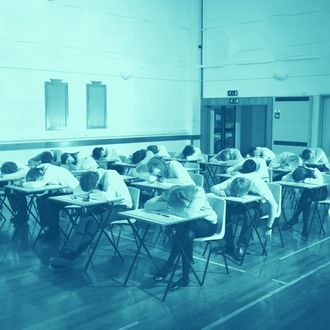
Each day is essentially a race against the clock for your rapidly tiring brain, according to the scientific literature on the concept of “cognitive fatigue.” As the day drags on, your mental resources start to dwindle, which is why people who study workplace productivity suggest getting the most important and complicated tasks out of the way first thing in the morning. Now new research is showing that this idea applies to the school day, too, and suggests that the time of day students take a test can predict their performance on it.
More specifically, the later in the day a test is taken, the lower the score, according to new research from Harvard Business School’s Francesca Gino, who recently wrote about her findings for the the Conversation. For the study, Gino teamed up with two Danish researchers — the University of Copenhagen’s Marco Piovesan and the Danish National Centre for Social Research’s Hans Henrik Sievertsen — and analyzed four school years of data from Danish public schools, focusing on students ages 8 to 15. Their results showed that “when the standardized test is taken an hour later in the day, it causes a deterioration in a student’s test score that corresponds to … students going to school for 10 fewer days every year.”
But there is a way to counteract this effect, this study found, and it is really simple: Give kids frequent breaks. When kids are given time to grab something to eat, run around outside, or just chat with their friends, the cognitive-fatigue effects seem to disappear and even reverse. As Gino explains, a break “causes an improvement in a student’s test score that corresponds to … students going to school for 19 extra days every year.”
You may have heard that some schools are beginning to experiment with later start times, because middle- and high-school students struggle to stay awake in early morning classes due to their adolescent body’s clock, which appears to be set to a later schedule. This new research suggests that the issue is a bit more complicated than it may have at first appeared, and that policymakers should consider building in enough times for adequate breaks, too. But the overarching idea is applicable to those of us whose school days are far behind us: Get the most important stuff done first, and then take a break.




